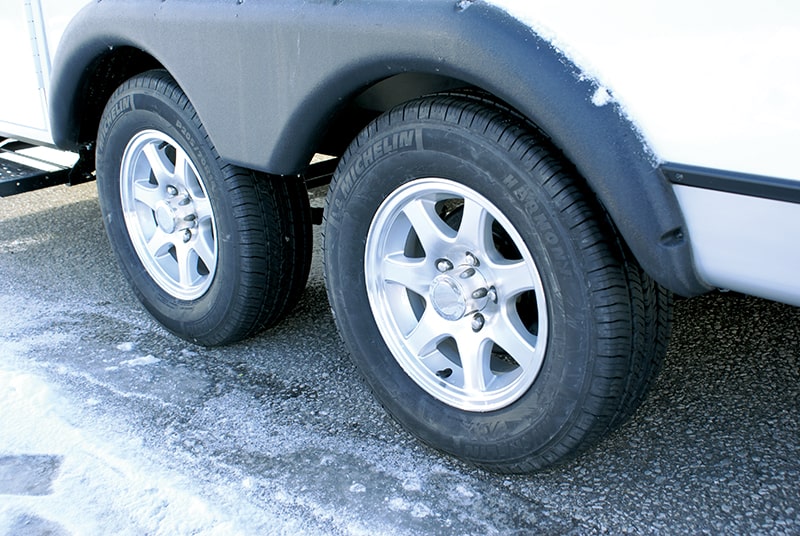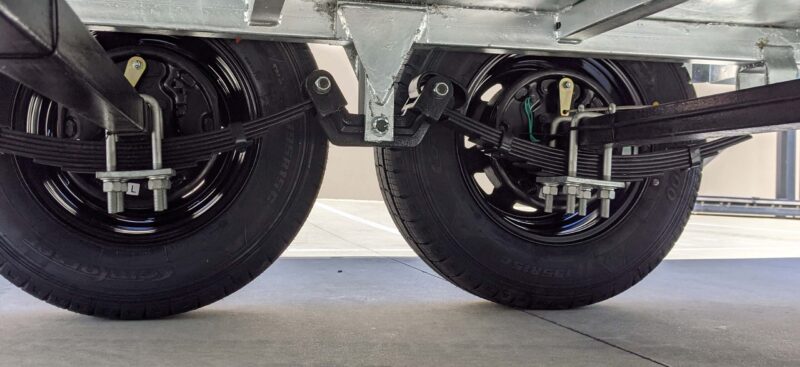The use of truck tires on travel trailers is a hotly debated topic that comes up in RVBlogger’s private Facebook group quite often. Specifically built to be used on RVs, travel trailer tires are very different than truck tires.
The argument is this: since the quality of trailer tires can be questionable, can you use truck tires on travel trailers?
Light truck tires are generally of good quality and are tougher than passenger car tires due to the increased strength of the side walls and heavier tread patterns. So it would seem like they would be an upgrade from trailer tires.
Unfortunately, there is more to consider when it comes to swapping out trailer tires for truck tires. Read on to learn more about truck tires, trailer tires, and why one is better than the other.
How Are Trailer Tires Different Than Truck Tires?
My husband Todd and I have owned a travel trailer and a 5th wheel, so we have learned quite a bit about trailer tires over our years of full-time RV living.
Trailer tires are definitely different than truck tires. Trailer tires are designed for slower speeds and high-weight loads. And braking and steering aren’t much of a consideration in the design of trailer tires.
Truck tires are designed for higher speeds, have higher sidewalls that are made to flex and bend for a more comfortable ride, and plenty of tread for optimal traction.
Trailer tires are generally rated for speeds under 65 mph, and they are not designed for the stresses of constant turning and braking. Since there are no drive or steering wheels on trailers, traction is not at the forefront like with vehicle tires.
At first glance, it may seem like the tread pattern is the only real difference, but keep in mind that manufacturers design truck and trailer tires for two different purposes. Tire manufacturers have a wide range of categories of tires for all different vehicle types and they all demand a specific tire.
What Is So Special About Travel Trailer Tires?
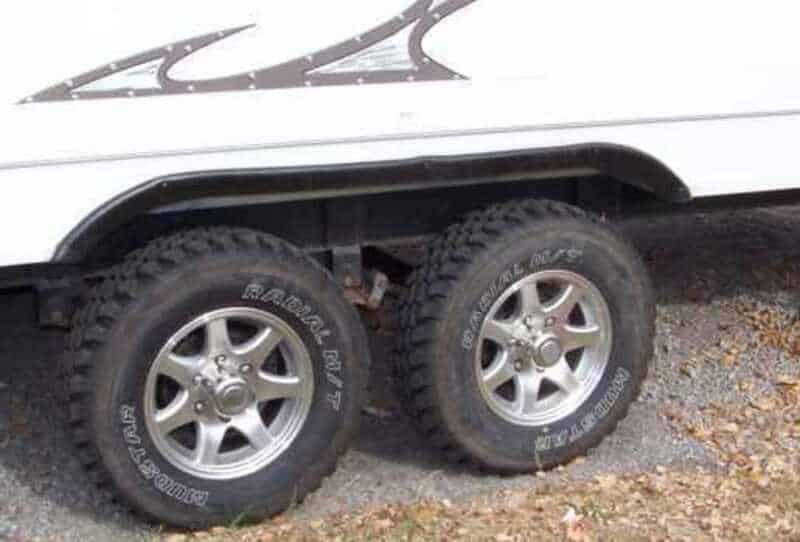
Characteristics such as modified sidewalls to deal with sway and load and minimal tread pattern that is symmetrical with a solid center bead are two big things that make trailer tires different.
Trailer tires are designed for free-rolling axles that do not control direction so they follow easily behind a tow vehicle. They must be sturdy enough for heavy loads and resist heat build-up and tread wear.
The sidewall design is stiff to offer durability and strength to aid in the trailer’s stability for stresses such as trailer sway and heavy loads.
Typically, camper trailer tires have about 10 percent more load capacity than a similar sized truck tire.
Trailer tires typically have ribbed treads with circumferential grooves. This tread pattern reduces rolling resistance and allows the tires to roll freely in the direction the trailer is being towed while dissipating heat quickly.
The ST designation on the tire sidewall identifies them as trailer-specific. Light truck tires will be identified with an LT. Manufacturers design and construct different tires for different purposes.
Can You Use Truck Tires On Travel Trailers?
The short answer is tire and trailer manufacturers do not recommend it. There are multiple reasons for this.
The sidewalls are the biggest factor to consider. Passenger vehicle tire manufacturers simply don’t design them for the loads and dissipation of heat from those shifting loads.
Tread patterns on truck tires can also be an issue as they are more likely to wear unevenly and have cupping and other wear problems when used on a trailer. The basic straight design of trailer tire treads is much more well-suited for this job.
Know that truck tires might be of good quality, but they are not designed for trailers.
In a pinch, an LT truck tire will definitely get you home; if that’s your spare, it’s certainly better than nothing. And for those who insist on using anything other than trailer tires, LT truck tires would be the best secondary option.
In our opinion, stick with what both RV and tire manufacturers recommend: trailer tires.
Pro Tip:
Don’t forget to replace your spare tire when you replace your travel trailer tires. All too often, the spare tire gets ignored. This is also true when filling your travel trailer tires with air.
Replacing cheap factory-brand tires for some higher quality trailer tires is definitely an option and, in most cases, a worthwhile investment.
What Brand of Trailer Tire Is Best?
Finding the brand of trailer that is the best is a lot of personal opinion. The tires you might get when you purchase a new trailer are sometimes called “China bombs.”
Type China bombs in the search feature in RVBlogger’s private Facebook group called RV Camping for Newbies and you will quickly learn all the negatives surrounding these tires.
Manufacturers often use cheaper tires that are said to blow out easier and might not be made in the USA. We’ve also noticed that some manufacturers are listening to buyers and using better-quality U.S. tire brands.
There may be some truth to the poor quality of these tires, and where they are manufactured, but RVers also have a certain level of responsibility to be diligent with tire maintenance. If you don’t take care of your tires, the name on the side doesn’t matter.
On a side note, the Department of Transportation (DOT) marking on your tire is its identification number. It shows the plant where your tire was manufactured and the week and year it was made.
Just as everyone has their favorite RV manufacturer, everyone has their favorite tire. You will find both good and bad reviews for all brands but these are among the most popular:
You can also find Greenball travel trailer tires at Costco. This has become a popular brand due to its price and Costco has had good reviews and feedback on the tires.
6 Ways to Prevent Travel Trailer Tire Blowouts?
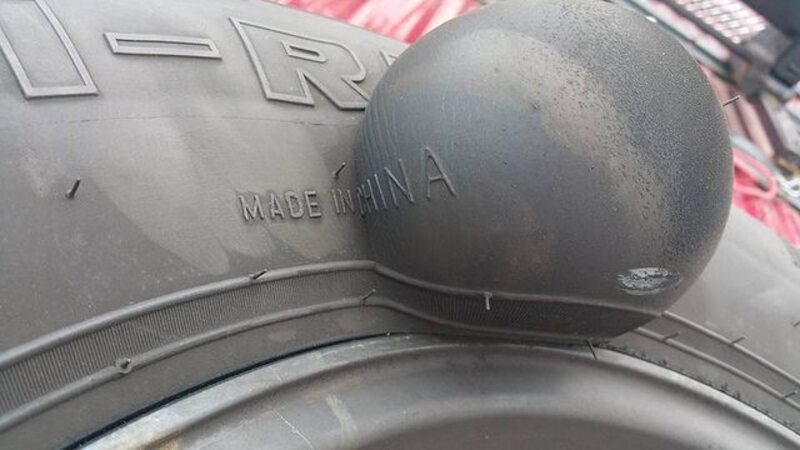
There are several ways you can help avoid an RV tire blowout. Any tire, no matter the price or brand, can have a blowout. However, caring for your tires is the best defense against tire problems.
You can reduce tire issues and avoid the expense and hassle of being stuck on the side of the road in 6 ways.
1. Maintain Proper Air Pressure
Maintaining proper air pressure is an important part of keeping your tires from blowing out. A tire pressure monitoring system is not expensive and helps you to keep an eye on pressure and temperature throughout your drive.
Always follow the manufacturer’s instructions on the inflation of your tires and be sure to account for the temperature of your tires when you fill them.
For example, if your trailer tires are hot because you have been on the road for a while then you would avoid filling them to the max psi noted on the tire.
Always check pressure before you head out for the day and even periodically when stopped on longer travel days.
By the way, we highly recommend the Tire Minder tire pressure monitoring system for travel trailers. And we highly recommend the VIAR air compressor to fill your trailer tires.
2. Watch Where You’re Driving
Driving your rig on dirt, gravel, or questionable roads can cause damage. Even road construction on the highway can cause a puncture with a nail or screw.
It doesn’t hurt to quickly inspect your tires at stops, particularly if you have been on bad roads. If you find yourself in a tight area with curbs, use a spotter to avoid pinching tires on curbs.
3. Reduce Your Speed
Excessive speed while pulling your trailer or driving your motorhome can cause tires to heat up quickly. Most RV tires are rated between 55 and 75 mph, with the latter being very fast for towing, in my opinion.
That extra bit of speed to get where you’re going is easily wiped away when you have a tire to change.
4. Don’t Overload Your Rig
Overloading your rig can also cause tires to blow out. Know your RV’s Gross Vehicle Weight Rating (GVWR) and keep it underweight.
Cat Scales are a great way to monitor your rig weight. They are located everywhere and are easy to use. The fee for Cat Scales is around $12. It’s a small amount to pay to keep you safe on the road.
5. Avoid Storing in Direct Sunlight
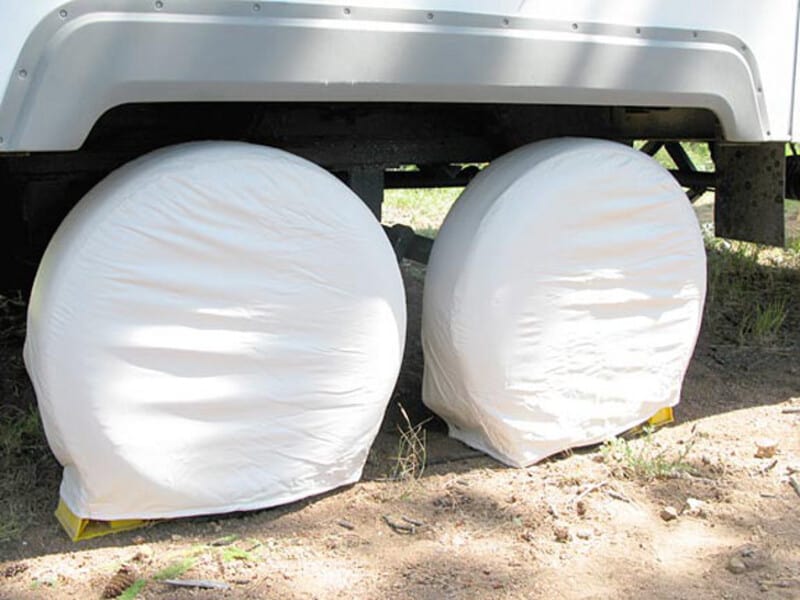
A covered or enclosed place to store your RV is great but not always feasible. Climate-controlled storage is also a great option but can be expensive.
If you can’t store your RV in one of these, or you live in it year-round, make sure you have tire covers that will block out the UV light, which can cause cracks in the sidewall that can lead to tire failure.
Buy a cover that is UV and mildew-resistant and elasticized for easy installation.
Tires have a chemical named antiozonate in the rubber that helps with drying out. As it makes its way to the surface it comes in contact with oxygen and the elements and turns brown. When this happens, your tires will dry out much faster and replacement is just around the corner.
Using tire protectants when cleaning your RV can help keep the rubber more supple and extend its life.
6. Replace Tires at Mileage Recommendation
Proper maintenance of your tires will go a long way toward keeping them useful and safe for their lifetime. However, no tire lasts forever.
When you buy an RV you just have to accept that replacing RV tires is a part of the game.
How Often Should You Replace Travel Trailer Tires?
You should replace your travel trailer tires at the mileage recommended by the manufacturer or at the first sign of any major issues. As suggested, regardless of mileage, most tires should be changed around the 5-7-year mark.
The manufactured date will be on the sidewall of the tire. When buying new tires it’s nice to be able to check this date first as you may have tires that have been sitting for an extended amount of time even though they are new.
If you notice any damage before the five years or so is up, you need to replace it. Damage can include signs of cracking, uneven wear, bulges in the tire, and browning on the sidewalls.
Final Thoughts About Truck Tires on Travel Trailers
While truck tires can be used on a travel trailer it is not recommended. Truck tires and trailer tires are manufactured for their own specific uses.
Tires are what keeps us rolling down the road, literally! Although a large expense, investing in quality trailer tires is a smart thing to budget for. This is especially true for those RVers who like to pack on the miles.
Finally, know that keeping your trailer tires maintained is very important. No tire brand or type is going to last underinflated, overloaded, or overheated. Having a blowout on the highway and getting stuck on the side of the road is not fun. Keep your tires maintained and stay safe!
Related Reading:
– Do RVs Have Spare Tires?
– How Often Should Travel Trailer Tires Be Replaced?
– Should You Fill Your Travel Trailer Tires With Nitrogen?
– How Often Should You Grease Travel Trailer Wheel Bearings?
About the Author:
Terri Nighswonger and her husband Todd have been RVing and work camping for five years with their Cavalier King Charles Spaniel, Newton, and their Minnie Australian Shepherd, Remi.
They originate from the Midwest but plan to enjoy the West for a few years, wintering in Arizona and summering wherever the road may lead. Writing is Terri’s passion, but she also loves hiking, kayaking, walking her dogs, and anything she can do outdoors.


